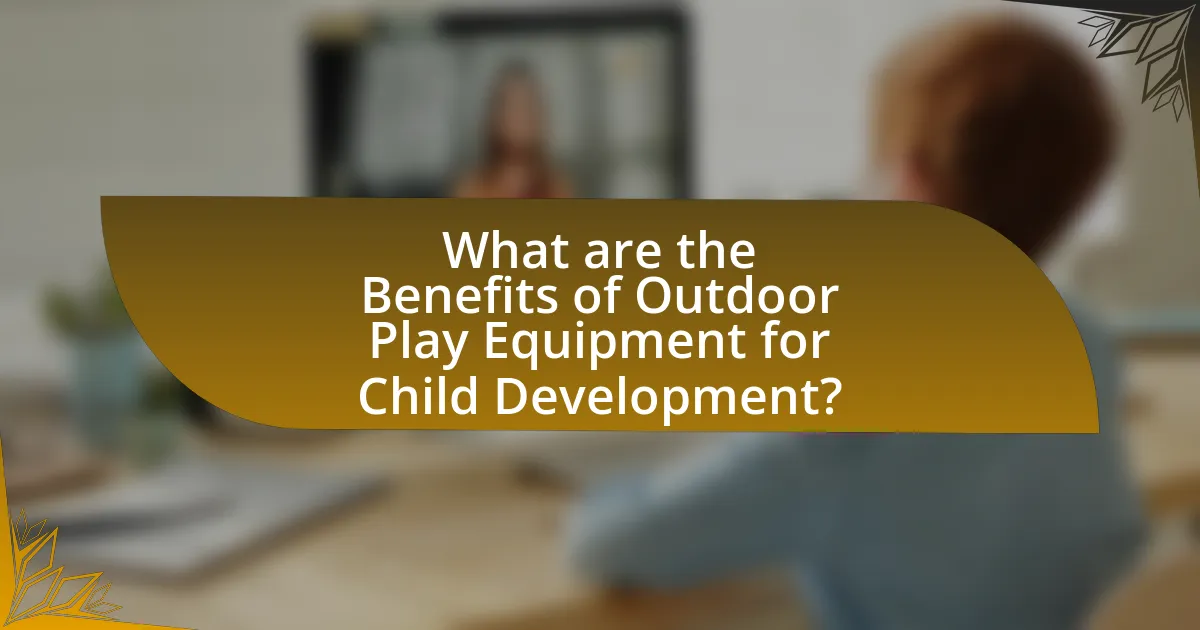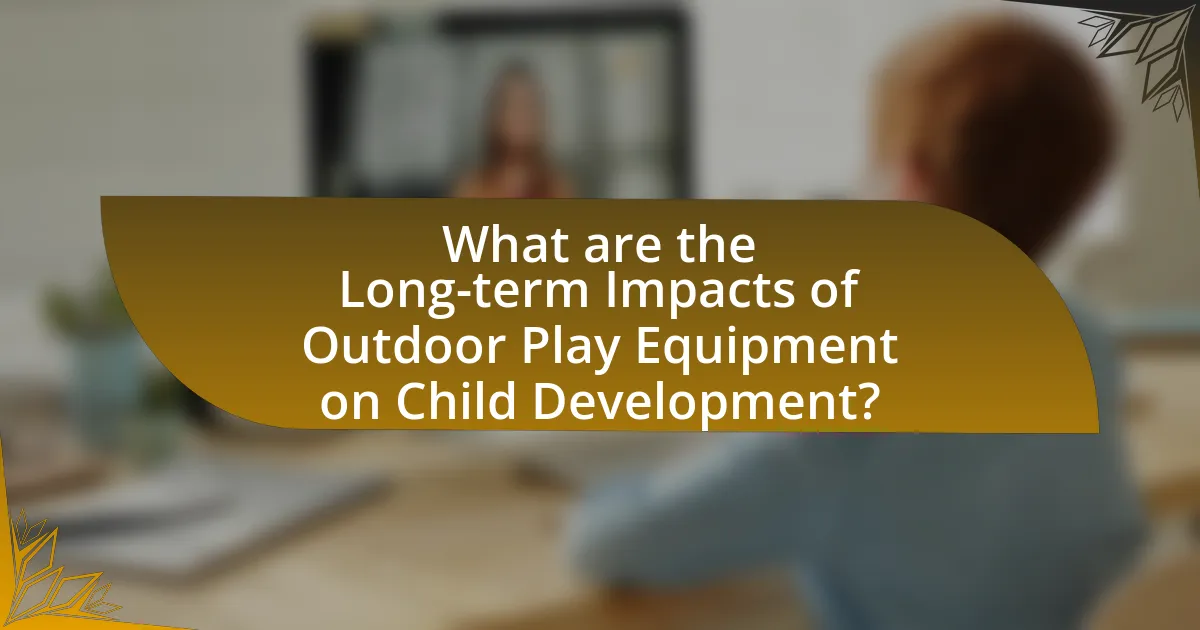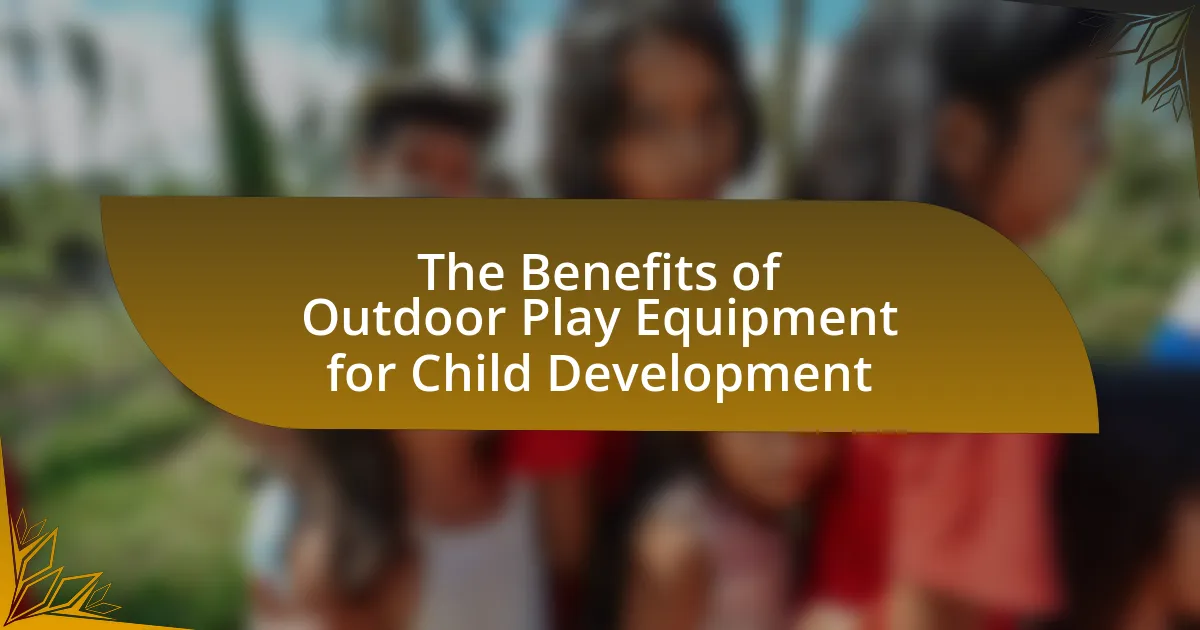Outdoor play equipment plays a crucial role in child development by enhancing physical, social, and cognitive skills. Engaging with structures such as swings, slides, and climbing frames promotes gross motor skills, coordination, and strength, while also fostering social interaction and problem-solving abilities. Research indicates that regular outdoor play contributes to better physical health, improved social competence, and enhanced cognitive functions, ultimately supporting holistic development. The article will explore the specific benefits of various types of outdoor play equipment, the importance of age-appropriate choices, and the long-term impacts on children’s health and well-being.

What are the Benefits of Outdoor Play Equipment for Child Development?
Outdoor play equipment significantly enhances child development by promoting physical, social, and cognitive skills. Engaging with equipment such as swings, slides, and climbing structures encourages children to develop gross motor skills, improve coordination, and build strength. Research indicates that children who participate in outdoor play exhibit better physical health, with studies showing that active play reduces the risk of obesity and related health issues.
Additionally, outdoor play fosters social skills as children interact, negotiate, and collaborate with peers, which is essential for emotional intelligence and teamwork. A study published in the Journal of Environmental Psychology found that children who play outdoors are more likely to develop problem-solving skills and creativity, as they navigate challenges presented by their environment.
Overall, outdoor play equipment serves as a vital tool in holistic child development, supporting physical health, social interaction, and cognitive growth.
How does outdoor play equipment contribute to physical development in children?
Outdoor play equipment significantly contributes to physical development in children by promoting active play, which enhances motor skills, strength, and coordination. Engaging with equipment such as swings, slides, and climbing structures encourages children to run, jump, and climb, which are essential activities for developing gross motor skills. Research indicates that children who regularly use outdoor play equipment show improved balance and agility, as these activities require them to navigate different physical challenges. For instance, a study published in the Journal of Physical Activity and Health found that children who participated in outdoor play exhibited higher levels of physical fitness compared to those with limited access to such equipment. This evidence underscores the critical role outdoor play equipment plays in fostering essential physical abilities in children.
What specific physical skills are enhanced through outdoor play?
Outdoor play enhances specific physical skills such as gross motor skills, coordination, balance, and strength. Engaging in activities like climbing, running, and jumping develops gross motor skills, which are essential for overall physical development. Coordination is improved through activities that require hand-eye or foot-eye coordination, such as throwing or catching a ball. Balance is enhanced by navigating uneven surfaces or using equipment like swings and slides. Strength is built through climbing and other physically demanding activities. Research indicates that children who engage in regular outdoor play demonstrate better physical fitness and motor skills compared to those who do not participate in such activities.
How does outdoor play equipment promote overall health and fitness?
Outdoor play equipment promotes overall health and fitness by encouraging physical activity, which enhances cardiovascular health, muscle strength, and coordination. Engaging with equipment such as swings, slides, and climbing structures requires children to run, jump, and climb, thereby increasing their heart rate and improving endurance. Research indicates that children who participate in regular outdoor play are less likely to be overweight and have a lower risk of developing chronic diseases. For instance, a study published in the Journal of Physical Activity and Health found that children who engage in outdoor play for at least 60 minutes daily have better physical fitness levels compared to those who do not. This evidence supports the notion that outdoor play equipment is essential for fostering a healthy, active lifestyle in children.
In what ways does outdoor play equipment support cognitive development?
Outdoor play equipment supports cognitive development by providing children with opportunities for problem-solving, creativity, and social interaction. Engaging with equipment such as climbing structures and swings encourages children to navigate challenges, enhancing their critical thinking skills. For instance, when children figure out how to climb a structure or balance on a beam, they develop spatial awareness and motor planning, which are essential cognitive skills. Additionally, outdoor play often involves group activities that foster communication and collaboration, further enhancing cognitive abilities through social learning. Research indicates that children who engage in regular outdoor play demonstrate improved attention spans and better academic performance, highlighting the direct link between outdoor play equipment and cognitive growth.
What types of problem-solving skills are fostered through outdoor play?
Outdoor play fosters various problem-solving skills, including critical thinking, teamwork, and adaptability. Children engage in activities that require them to assess situations, make decisions, and devise strategies to overcome challenges, such as navigating obstacles or collaborating with peers. Research indicates that outdoor play enhances cognitive flexibility, allowing children to adjust their approaches based on changing circumstances. For instance, a study published in the Journal of Adventure Education and Outdoor Learning found that children who participated in outdoor play demonstrated improved problem-solving abilities compared to those who engaged in indoor activities. This evidence supports the notion that outdoor environments stimulate essential problem-solving skills in children.
How does outdoor play encourage creativity and imagination in children?
Outdoor play encourages creativity and imagination in children by providing them with unstructured environments where they can explore, experiment, and engage in imaginative play. In these settings, children can create their own games, build structures, and interact with natural elements, which stimulates their cognitive and social development. Research indicates that outdoor play enhances problem-solving skills and fosters innovative thinking, as children learn to navigate challenges and collaborate with peers. A study published in the journal “Child Development” found that children who engage in outdoor play demonstrate higher levels of creativity compared to those who play indoors, highlighting the importance of nature and open spaces in fostering imaginative capabilities.
How does outdoor play equipment facilitate social development among children?
Outdoor play equipment facilitates social development among children by providing opportunities for interaction, cooperation, and communication. When children engage in activities such as climbing, sliding, or playing games on outdoor equipment, they naturally form social groups, negotiate roles, and develop teamwork skills. Research indicates that children who participate in outdoor play are more likely to develop social skills, such as sharing and conflict resolution, as they navigate social dynamics in a playful environment. For instance, a study published in the “Journal of Play” found that children who frequently use playgrounds exhibit higher levels of social competence compared to those who do not engage in outdoor play. This evidence underscores the importance of outdoor play equipment in fostering essential social skills during childhood.
What role does outdoor play have in teaching teamwork and cooperation?
Outdoor play plays a crucial role in teaching teamwork and cooperation by providing children with opportunities to engage in group activities that require collaboration. During outdoor play, children often participate in games and challenges that necessitate communication, problem-solving, and shared decision-making, which are essential components of effective teamwork. Research indicates that children who engage in outdoor play develop social skills that enhance their ability to work with others, as they learn to negotiate roles, share resources, and support one another in achieving common goals. For instance, a study published in the Journal of Adventure Education and Outdoor Learning found that outdoor play significantly improves children’s social interactions and cooperative behaviors, reinforcing the importance of these experiences in fostering teamwork and cooperation.
How does outdoor play equipment help children develop communication skills?
Outdoor play equipment helps children develop communication skills by providing opportunities for social interaction and collaborative play. When children engage with equipment such as swings, slides, and climbing structures, they often play in groups, which encourages them to express their thoughts, negotiate roles, and share ideas. Research indicates that play environments that promote interaction can enhance language development; for instance, a study published in the Journal of Child Psychology and Psychiatry found that children who frequently engaged in outdoor play exhibited improved verbal communication skills compared to those who played indoors. This interaction fosters not only vocabulary expansion but also the ability to understand and interpret social cues, essential components of effective communication.

What Types of Outdoor Play Equipment are Most Beneficial?
The most beneficial types of outdoor play equipment include climbing structures, swings, slides, and balance beams. Climbing structures promote physical strength and coordination, while swings enhance balance and spatial awareness. Slides provide opportunities for risk-taking and thrill, contributing to emotional development. Balance beams improve stability and focus, fostering motor skills. Research indicates that children engaging with diverse outdoor play equipment experience enhanced physical, social, and cognitive development, as supported by studies from the American Academy of Pediatrics, which emphasize the importance of active play in childhood growth.
What are the different categories of outdoor play equipment?
The different categories of outdoor play equipment include climbing structures, swings, slides, and interactive play panels. Climbing structures, such as jungle gyms and climbing walls, promote physical strength and coordination. Swings provide opportunities for balance and rhythm, while slides enhance gross motor skills through climbing and descending. Interactive play panels, which often include games or educational features, stimulate cognitive development and social interaction among children. Each category serves a specific developmental purpose, contributing to a child’s physical, social, and cognitive growth.
How do climbing structures contribute to child development?
Climbing structures significantly contribute to child development by enhancing physical, cognitive, and social skills. Engaging in climbing activities promotes gross motor skills, as children develop strength, balance, and coordination while navigating various heights and obstacles. Research indicates that children who regularly use climbing structures show improved physical fitness levels, which is crucial for overall health and development.
Additionally, climbing encourages problem-solving and critical thinking as children assess their climbing routes and make decisions about how to navigate challenges. A study published in the Journal of Adventure Education and Outdoor Learning found that outdoor climbing activities foster resilience and self-confidence in children, as they learn to overcome fears and take calculated risks.
Socially, climbing structures provide opportunities for cooperative play, where children learn to communicate, share, and collaborate with peers. This interaction is essential for developing social skills and emotional intelligence. Overall, climbing structures serve as a multifaceted tool for holistic child development, integrating physical, cognitive, and social growth.
What benefits do swings and slides offer for children?
Swings and slides provide essential physical, social, and cognitive benefits for children. Physically, swings enhance balance, coordination, and muscle strength as children propel themselves back and forth, while slides promote gross motor skills as they climb and descend. Socially, these play structures encourage interaction among peers, fostering teamwork and communication skills as children take turns and engage in cooperative play. Cognitively, the thrill of swinging and sliding stimulates sensory experiences and risk assessment, contributing to problem-solving abilities. Research indicates that outdoor play, including the use of swings and slides, is linked to improved physical health and social development in children, as highlighted in studies by the American Academy of Pediatrics.
How can parents choose the right outdoor play equipment for their children?
Parents can choose the right outdoor play equipment for their children by assessing safety, age appropriateness, and developmental benefits. Safety is paramount; equipment should meet safety standards set by organizations like the American Society for Testing and Materials (ASTM) and the Consumer Product Safety Commission (CPSC). Age appropriateness ensures that the equipment matches the child’s developmental stage, as younger children require different features compared to older ones. Additionally, selecting equipment that promotes physical activity, social interaction, and cognitive development can enhance children’s overall growth. Research indicates that outdoor play contributes significantly to physical health and social skills, making informed choices essential for maximizing these benefits.
What safety features should be considered when selecting outdoor play equipment?
When selecting outdoor play equipment, key safety features to consider include impact-absorbing surfaces, sturdy construction, and age-appropriate design. Impact-absorbing surfaces, such as rubber mats or wood chips, reduce the risk of injury from falls, as studies show that proper surfacing can decrease fall-related injuries by up to 50%. Sturdy construction ensures that the equipment can withstand the weight and activity levels of children, which is critical for preventing accidents. Additionally, age-appropriate design ensures that the equipment is suitable for the developmental stages of children, minimizing hazards associated with inappropriate use. These features collectively enhance the safety of outdoor play environments, promoting healthier play experiences.
How does age appropriateness influence the choice of outdoor play equipment?
Age appropriateness significantly influences the choice of outdoor play equipment by ensuring that the equipment is safe and suitable for the developmental stages of children. For instance, equipment designed for toddlers, such as low slides and soft climbing structures, promotes gross motor skills while minimizing the risk of injury. In contrast, equipment for older children, like climbing walls and larger swings, encourages more complex physical challenges and social interactions. Research indicates that age-appropriate play equipment can enhance physical development, cognitive skills, and socialization, as children engage in activities that match their abilities and interests. Therefore, selecting outdoor play equipment based on age appropriateness is crucial for maximizing developmental benefits while ensuring safety.

What are the Long-term Impacts of Outdoor Play Equipment on Child Development?
Outdoor play equipment significantly enhances child development in the long term by promoting physical, social, and cognitive skills. Engaging with outdoor play structures encourages children to develop gross motor skills, improve coordination, and increase physical fitness, which are essential for overall health. Research indicates that children who regularly use outdoor play equipment exhibit better social skills, as they learn to cooperate, share, and resolve conflicts during play. Additionally, outdoor play fosters creativity and problem-solving abilities, as children navigate challenges presented by various play structures. A study published in the “Journal of Environmental Psychology” found that children who engage in outdoor play demonstrate improved attention spans and reduced symptoms of anxiety and depression, highlighting the mental health benefits associated with regular outdoor activity.
How does early exposure to outdoor play equipment affect lifelong habits?
Early exposure to outdoor play equipment significantly influences lifelong habits by promoting physical activity and social interaction. Engaging with outdoor play equipment during childhood fosters a preference for active lifestyles, as children develop motor skills and confidence in their physical abilities. Research indicates that children who regularly use outdoor play equipment are more likely to maintain higher levels of physical activity into adulthood, reducing the risk of obesity and related health issues. A study published in the Journal of Physical Activity and Health found that children who participated in outdoor play were 20% more likely to engage in regular exercise as adults, highlighting the long-term benefits of early exposure to such environments.
What evidence supports the link between outdoor play and academic success?
Research indicates that outdoor play significantly enhances academic success by improving cognitive functions and social skills. A study published in the Journal of School Health found that children who engage in regular outdoor play demonstrate better attention spans and improved problem-solving abilities, which are crucial for academic performance. Furthermore, the American Academy of Pediatrics emphasizes that outdoor play fosters creativity and critical thinking, skills that directly correlate with higher academic achievement. These findings collectively support the assertion that outdoor play is beneficial for children’s educational outcomes.
How does outdoor play influence emotional well-being in later life?
Outdoor play significantly enhances emotional well-being in later life by fostering resilience, social skills, and a connection to nature. Engaging in outdoor activities during childhood promotes the development of coping mechanisms and emotional regulation, which are crucial for mental health in adulthood. Research indicates that children who frequently play outside exhibit lower levels of anxiety and depression, leading to improved emotional stability as adults. A study published in the Journal of Environmental Psychology found that exposure to natural environments during childhood correlates with higher levels of life satisfaction and lower stress levels in later years. Thus, outdoor play serves as a foundational element for emotional well-being throughout life.
What practical tips can parents implement to maximize the benefits of outdoor play equipment?
Parents can maximize the benefits of outdoor play equipment by actively engaging with their children during playtime. This involvement not only enhances the child’s experience but also fosters social skills and emotional development. Research indicates that children who play with their parents are more likely to develop problem-solving skills and creativity, as they receive guidance and encouragement. Additionally, ensuring that the play area is safe and age-appropriate allows children to explore and take risks, which is crucial for their physical development. Regularly rotating and introducing new equipment can also keep the play experience fresh and stimulating, promoting ongoing interest and engagement.
How can parents encourage regular outdoor play in their children’s routines?
Parents can encourage regular outdoor play in their children’s routines by establishing a consistent schedule for outdoor activities. By designating specific times each week for outdoor play, parents create a routine that children can anticipate and look forward to. Research indicates that children who engage in regular outdoor play experience improved physical health, social skills, and cognitive development. For instance, a study published in the journal “Pediatrics” found that outdoor play significantly contributes to children’s overall well-being and development. Additionally, parents can enhance outdoor play by providing access to engaging play equipment, such as swings and climbing structures, which can motivate children to spend more time outside.
What strategies can be used to ensure safe and effective outdoor play experiences?
To ensure safe and effective outdoor play experiences, implementing comprehensive safety protocols is essential. These protocols include regular inspections of play equipment to identify and address potential hazards, ensuring that surfaces are soft and impact-absorbing, and providing adequate supervision during playtime. Research indicates that structured supervision can reduce the risk of injuries by up to 50%, highlighting its importance in outdoor settings. Additionally, educating children about safe play practices fosters a culture of safety, empowering them to make informed choices while engaging in outdoor activities.
